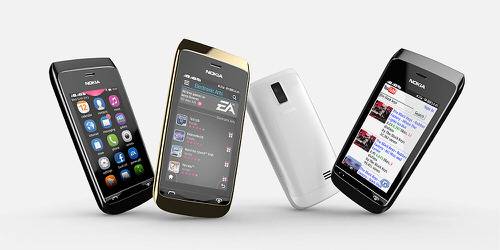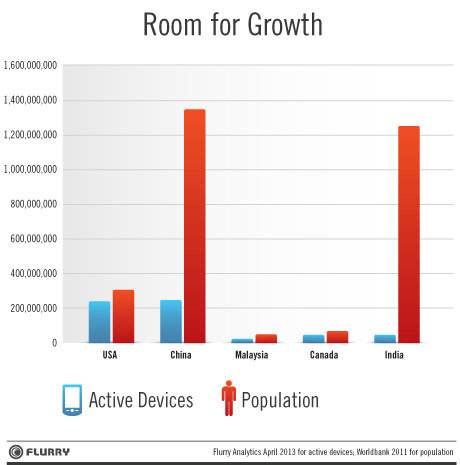
Lost amid the heated and increasingly dull iPhone versus Android rhetoric is the prospect of the world on the cusp of placing amazing personal computing technology—smartphones—into the hands of not just a billion people, but billions of people.
See also: New Firefox OS Phones Spur The Future Of The Mobile Web
Most new smartphones these days are destined not for America, but for India, Africa, South America and Asia. This giant market will forever alter the personal computing industry. More importantly, it will almost certainly have a sizable and cascading impact on the Web itself, on cultures and economics, and on how people connect with one another.
Emerging Market Growth
IDC expects about a billion smartphones to sell this year alone. This is a 33% increase over last year, and is fueled primarily by “emerging market demand.”
Smartphones have become increasingly common in emerging markets and it is often the first affordable means of computing for these markets.
What’s driving emerging market demand, however, is the rapid drop in price. In 2012, smartphones priced at $250 or less—no contract required—comprised 37% of all sales. Yet the market for smartphones priced between $75 and $100 grew an astounding 750%.
Prices are continuing to fall. IDC notes that smartphone prices fell 8% in 2012 and will drop 9% in 2013.
Yet this market is far from saturated. While smartphone demand is growing at nearly 50% in the U.S., by global standards that’s anemic. This chart from Flurry reveals how few people in select areas of the world yet own a connected smartphone or tablet.

Testing The Nokia Asha
Just as surprising as the rapid drop in price is the rather astounding functionality of these devices. For example, the small, attractive Nokia Asha 310, available for only $100—that’s full price, with no carrier subsidy—offers the following:
- Phone and messaging
- GPS/maps
- Capacitive touchscreen
- 3MP camera
- App store/Music store
- Acceptable sound quality
- Facebook, Twitter and several EA games pre-loaded
- Popular apps like WhatsApp
- Exchange, Gmail and Yahoo Mail can be configured on the device
- It’s even possible, according to Nokia, to edit Microsoft Office documents, although I did not try this
I’ve been using an Asha loaned to me by Nokia (it is typically not offered in the U.S.). While the device has some significant failings, including surprisingly poor WiFi reliability, I was still repeatedly struck by its capabilities.
Along with the features listed above, the Asha 310 offers dual SIM support, which allows users to operate the phone for work and personal use and to take advantage of the lowest calling rates. This is an important feature in some parts of the world.
See also: With Firefox OS, Mozilla Takes On The ‘Closed’ Internet—Again
The Asha does not offer multitasking, does not support 3G, and its “Xpress Browser” doesn’t offer the full Web experience. Nonetheless, the Asha 310 does nearly everything you can do on an iPhone, excepting video and video calling—just not as well, not as fast, not as easily. But it’s only $100!

Smartphones For The Next Five Billion
Despite all that, I’m still not convinced there’s a long-term future for the Asha. Android, which already accounts for at least 50% of the global smartphone market, shows no signs of slowing down. Just last month, for example, Google opened Android Nation in India—a brick-and-mortar retail store and a clear sign of Google’s determination to grow Android in one of the world’s largest markets.
Google is planing to open several such stores throughout India. Android Nation serves as an “Android experience center”—think Apple Store, but for Android.
Nonetheless, the market is so big and growing so fast that it’s equally difficult to believe that only Android, or only Android and iPhone, for example, will dominate the planet. Mozilla CEO Gary Kovacs—out promoting the new Firefox OS for smartphones—said his organization is aiming at the next “2 billion smartphone users.”
I find it impossible to understand how 3,4,5 or 6 billion people are going to get their diverse needs satisfied by one or two or five companies, no matter how delicious those companies.
Low-cost Firefox OS smartphones will soon be available in select areas of the world.
Look East, Look South, Look Everywhere
Smartphones are not a status symbol, but a productive, creative communications tool used by more than a billion people seeking to improve their work, increase their wealth, add to their joys and connect them to their region and the world.
A $100 smartphone, amazing as it is, is not great. Not yet. Nonetheless, consider all that it can do for this price. Soon, billions will connect to Facebook and Twitter, to Google and medical resources, to learning and job opportunities, on an actual personal computer at a price once thought all-but-impossible. In this new reality, debates about iPhone versus Android have quickly become superfluous.
Consider this video Apple put together for developers at WWDC showcasing how (iPhone) apps can reach everyone and benefit anyone. If you can get past the Apple self-glorification, it’s a powerful illustration of how smartphones are connecting and empowering us all in ways we never imagined.
Today’s premium, costly iPhone 5 is likely 2016’s every-phone.
That is great news for the world.









